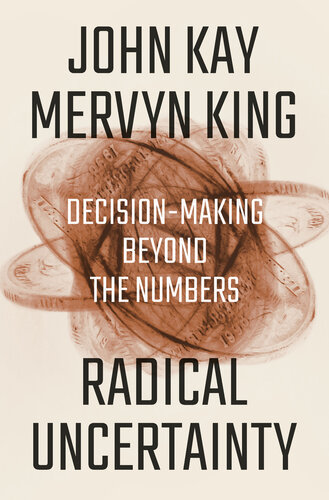
Radical Uncertainty
Decision-Making Beyond the Numbers
کتاب های مرتبط
- اطلاعات
- نقد و بررسی
- دیدگاه کاربران
نقد و بررسی

January 1, 2020
What do we know about the way economies work? According to two British economists, less than we think. As Donald Rumsfeld once observed, there are known knowns, known unknowns, and unknown unknowns, a vexation for the smartest strategist. Kay and King (The British Tax System, 1978) employ a like notion here: Although in economics there is a neat little concept called "perfect information," and although pricing is assumed to incorporate shared knowledge, the governing principle of the real world is uncertainty--and most of the time, we don't know what we don't know. This "radical uncertainty" means that our understanding of the present is incomplete and of the future, even more fragmentary, meaning that economists are forced to rely on something akin to hunches. They must explain by way of "narrative reasoning...the most powerful mechanism for organizing our imperfect knowledge," creating stories about the world that incorporate our experiences, the experiences of others, and such reliable data as we are able to assemble in a "world of uncertain futures and unpredictable consequences." A repeated example throughout the book is the probabilistic assessment Barack Obama received when determining whether to launch the raid that killed Osama bin Laden: It wasn't 100% sure that bin Laden was in that Pakistani compound, and a botched operation might have meant war. That things worked out as they did was by no means guaranteed, and neither is following the rules of economics: Supply and demand is a powerful explanatory tool, but it explains only so much about how people and markets behave. While a sophisticated knowledge of economic concepts is a desideratum for following the authors' argument closely, many of their takeaways don't require much expertise. "Never rely on data without asking 'What is the source of this information?' " they counsel, helpfully, one of many dicta to help overcome the shadowy unknowns that elude us even with the benefit of hindsight, such as why recessions hit when they do. A powerful way of looking at the market, of much use to investors and strategists.
COPYRIGHT(2020) Kirkus Reviews, ALL RIGHTS RESERVED.

February 10, 2020
British economists Kay and King (The British Tax System) criticize the quantitative direction of modern economic science in this witty yet overstuffed account. Arguing that people “cannot possibly assess the consequences of all conceivable choices,” Kay and King take behavioral economists such as Daniel Kahneman to task for dismissing humans’ cognitive mechanisms as biased or irrational. Hypothetical models and probabilistic thinking, the authors contend, fail to account for the “radical uncertainty” of the real world. They advocate for “the value of simple heuristics, or rules of thumb,” and highlight the central role that narratives and contextual reasoning play in decision making. Kay and King use numerous anecdotes to back up their claims, including President Obama’s 2011 decision to authorize the raid on Osama bin Laden’s hideout in Pakistan, the 2008 financial crisis, and the experiences of business tycoons including Warren Buffett and Steve Jobs. Though readers will appreciate the authors’ dry sense of humor and flare for thumbing their noses at academic peers, the book’s repetitions and overreliance on anecdotes (some of them fictional) undercut its central arguments. Even dedicated students of economics who are open to Kay and King’s perspective will find their patience tested by this dense call for reform.

March 6, 2020
This illuminating work presents compelling arguments about the distinction between the concepts of risk and uncertainty, and the impact of both on modern finance, economics, and decision-making. Financial and economic risks often are calculated, and future risks are predicted, using various mathematical methods, especially probabilistic distributions. Uncertainty is defined as information that is unknown. Economists Kay (fellow, St John's Coll., Oxford; Other People's Money: The Real Business of Finance) and King (Stern Sch. of Business, New York Univ.; The End of Alchemy: Money, Banking, and the Future of the Global Economy) show how radical uncertainty stems from the economic idea of Knightian uncertainty, in which there is a lack of quantifiable knowledge. These radical uncertainties are associated with a lack of information; therefore, they cannot be measured or calculated. The authors recommend using narratives and other qualitative methods to make well-informed decisions, and they use several historical anecdotes across industries and institutions to support their assertions. VERDICT This informative book will appeal to readers wishing to delve further into the processes of modern finance and economic forecasts.--Caroline Geck, Somerset, NJ
Copyright 2020 Library Journal, LLC Used with permission.

























دیدگاه کاربران